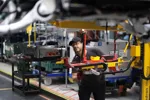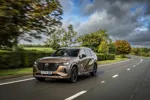The availability and accessibility of charge points could overcome one of the “biggest barriers” to the adoption of electric vehicles (EVs).
That’s according to the fleet industry and a Fleet News poll which revealed almost a third (29.2%) of drivers would make the switch to an EV if they were able to charge their car at the pumps.
A further one in five (22.2%) said they would consider choosing an EV, while one in 10 (9.9%) said they already drive a plug-in car.
The poll was conducted after the Government announced in the Queen’s Speech that it would introduce an Automated and Electric Vehicles Bill which will require the installation of charge points for EVs at motorway service areas and large fuel retailers.
The UK’s largest leasing company, Lex Autolease, welcomed the move. “One of the biggest barriers to greater adoption of electric vehicles is range anxiety, so more charging points at petrol stations and motorway services will help to address that fear,” said Chris Chandler, the firm’s principal consultant.
“The measures are a recognition of the need for pathway charging – essentially making it easier for electric vehicle drivers to get from one end of the country to the other, without worrying about their next charging point. This should broaden their appeal and open up the market for electric vehicles across the UK.”
Both Total and Shell had already confirmed their intention to install charge points at their stations, while earlier this year the head of BP Fuel Cards in the UK, Andy Allen, told Fleet News that charge points were a ‘logical step’ for the fuel giant.
Currently, there are 6,980 electric vehicle (EV) public charge points in the UK at 4,523 locations, including 1,057 rapid chargers, according to Zap Map, a website which tracks charge point location and information.
Alison Bell, marketing director at Venson Automotive Solutions, said: “Research we conducted recently found that 85% of motorists would consider buying an electric vehicle; however; 69% said that the lack of charging points across the UK would be the biggest deterrent.
“Our research shows there is an appetite for electrical vehicles, but motorists do have their reservations when it comes to the day-to-day running of the vehicle. Hopefully this Bill should move forward plans to invest in infrastructure for electric vehicles.”
However, Brian Madderson, chairman of the Petrol Retailers Association (PRA), called for “clarity” over the definition of ‘large retailers’.
He said: “The measure forms part of a Government push to increase the number of electric vehicles on UK roads. However, the PRA is concerned this could place an unreasonable financial burden on independent fuel retailers who feel there is insufficient market demand to justify the investment at this time.
“The PRA recommends that the Government introduces a centralised monetary fund allowing private businesses to apply for grants which will underwrite such speculative investment in rapid charge equipment.”
Newly released data from the Department for Transport (DfT) shows that the number of ultra-low emission vehicles (ULEVs) surpassed the 100,000 mark in March and now stands at 108,641, with 92,414 plug-in cars registered and 3,358 plug-in vans.
Registrations of plug-in pure EVs were up by almost half (46.2%) in the first five months of this year compared to last, according to figures from the Society of Motor Manufacturers and Traders (SMMT).
The number of petrol hybrid registrations was also up, by 42.3%, while 15,641 cars had been eligible for the plug-in grant.
The Government offers a plug-in car grant worth up to £4,500 off the price of an electric vehicle, £8,000 off the price of an electric van and up to £1,500 off the price of an electric motorbike.
It announced in December 2015, that the plug-in car grant would continue until at least March 2018, but earlier this year it said that the current rates will continue until October 2017, at which point it will carry out a review.

















Jonathan Davies - 11/07/2017 10:42
Increasing the availability and accessibility of charge points can only be good news for the adoption rates of plug-in vehicles. Range anxiety has been the biggest barrier to more company car drivers making the switch to electric vehicles and the Government’s desire to mandate them at service stations will help. However, the P11D price for plug-ins still remains high when compared to internal combustion engine alternatives. If the Government really wants to increase adoption rates perhaps it’s about time that the P11D price reflected the plug-in grant, bringing down further the amount employees and employers would pay in tax.